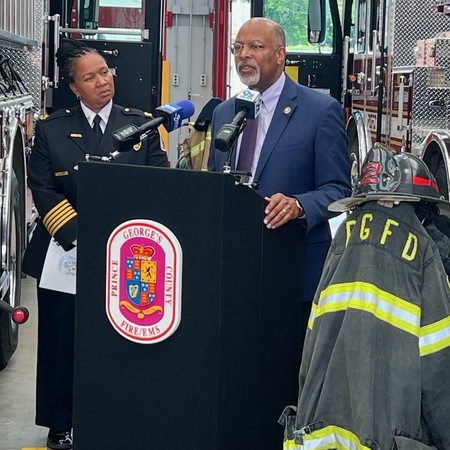By Tashi McQueen,
AFRO Political Writer,
tmcqueen@afro.com
In recent years, Americans have been raising concerns about toxic chemicals found in drinking water within firefighters protective gear, which largely include PFAS, a “forever chemical” found in polyfluoroalkyl substances which feature particles that slowly break down over time.
Since the 1950s, products made with these chemicals have been the lead occupational cause of death for firefighters, according to the Center for Disease Control. Due to its severity, advocacy groups and legislators have taken the fight to Congress and the legal system on behalf of first responders.
“Chemical companies, which have known for years about the cancer-causing properties of PFAS, have seen increased profits while firefighters face repeated exposure to the toxins in our gear,” said Edward Kelly, International Association of Firefighters (IAFF) general president. “The PFAS Alternatives Act can change this sad fact by putting firefighters – not corporate interests – at the center of the research for next-generation gear.
“First responders deserve first-rate gear. They put their lives on the line every day to save ours.
We must not make those who risk their lives wear even riskier equipment and handle even more dangerous materials,” U.S. Rep. Glenn Ivey (D-MD-04) commented in a statement to the press. “PFAS are directly linked to cancer and as a kidney cancer survivor, I know the hardship, uncertainty and fear any family would experience being exposed to cancer-causing materials. This bill will save our firefighters from this exposure and is a good way to show our appreciation to the men and women ready to rush into danger when others dodge it.”
Ivey and seven other representatives co-sponsored the Bipartisan PFAS Alternatives Act on July 20 with hopes of preventing more deaths.
The legislation aims to support the development, research and testing of PFAS-free PPE for firefighters while improving protection from exposure to fire particles, side effects of combustion and visible warning gauges to alert firefighters about exposures to hazardous materials.
It would also authorize the U.S. Fire Administration to manage $25 million annually for the next four years with an additional $2 million annually to support the production.
“We expect and hope to have a Senate version of the bill introduced very soon,” said Timothy Burn, press secretary for IAFF.
The IAFF worked closely with legislators and their staff for over a year to help develop the bill’s text, according to Burn.
“PFAS contains thousands of different chemicals. We need to hold these companies responsible and ensure they no longer use them,” Maryland Del. Sara Love (D-MD-16), lead sponsor of the George Walter Taylor Act, told the AFRO.
Other efforts towards limiting the use of PFAS include the EPA’s 2021-2024 commitment to action for PFAS and IAFF 2022 commitment to ending firefighter cancer and eliminating PFAS from use in fire rescue.
The George Walter Taylor Act is named after a firefighter from Patuxent, Maryland, who died from Metastatic Neuroendocrine cancer due to 31 years of PFAS exposure in May 2020.
“My husband, George Walter Taylor, was 46 years old when he died. We were married for almost 20 years,” Christine Taylor shared. “Firefighters like Walter are the canary in the coal mine for these chemicals which are putting all of us at risk as they make their way into the air we breathe, the water we drink, and the food we eat.”
The Act prohibits a person or business from manufacturing, using or selling Class B fire-fighting foam, rugs, carpets and food packaging with intentionally added PFAS chemicals within the state of Maryland. It will go into effect on or after January 1, 2024.
The legislation will also hold grocery stores and fast food chains accountable for PFAS in their food packaging in 2024.
Even though regulation is underway, PFAS remains in nonstick cookware, water-resistant rugs, well water, various fabrics, food packaging, rain jackets and contaminated soil.
“PFAS is a highly profitable product for chemical manufacturers and these companies have shown their inclination for prioritizing profits over safety,” said Burn. “We’re going to continue our fight to show the known dangers of PFAS and the need to protect our communities.”
According to Burn, corporations producing items containing PFAS are still resistant to the change.
In March, IAFF announced a lawsuit they filed against the National Fire Protection Association (NFPA) for its alleged role in a testing standard that requires the use of PFAsin firefighter protective gear.
“The NFPA understands the complex health risks that come with firefighting, and we’re deeply sympathetic to the terrible toll that cancer takes on firefighters and their families,” said Lorraine Carli, vice president of Outreach and Advocacy at NFPA. “The NFPA protective gear standard does not specify or require the use of any particular materials, chemicals or treatments for that gear. It does require a moisture barrier test to ensure the gear will protect the wearer. The manufacturer decides how to comply with that test.”
Tashi McQueen is a Report For America Corps Member.



